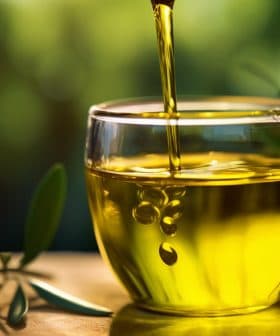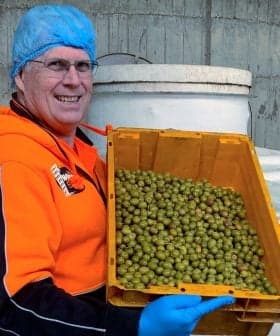Natural Olive Oil Preservative as Effective as Synthetic Ones
Researchers found that oleoresin had competitive antioxidant properties without the same health risks associated with the synthetic antioxidants
A study found that adding tomato peel extracts to refined olive oil can extend the product’s shelf life, with oleoresin showing competitive antioxidant properties without the health risks of synthetic alternatives. Researchers from Tunisia concluded that using tomato peel oleoresin as a preservative is preferable to synthetic antioxidants for preventing oxidation reactions during long storage periods, as demand for oleoresins increases in Europe due to a trend toward natural ingredients and preservatives.
A new study has found that adding tomato peel extracts to refined olive oil increases the product’s shelf life.
Researchers from the University of Sfax and Ayachi Group Industry in Tunisia compared the stabilizing effects of adding oleoresin and synthetic antioxidants to the oils.
Extracts from tomato industrial byproducts can be used as an effective stabilizer against the oxidation reactions during long storage.
When olive oil is refined some of its natural antioxidants are partially eliminated and therefore must be supplemented in order to prevent the oil from spoiling. Olive oil must be refined when the quality is too low to be safely consumed. According to the International Olive Council, more than 50 percent of olive oil produced in the Mediterranean region is refined.
The group of researchers found that oleoresin had competitive antioxidant properties without the health risks associated with the synthetic antioxidants.
Oleoresin is a lycopene-rich extract from tomato peels. Up until a certain point, the compound protects olive oil against oxidation, a process which spoils the oil. The study found that 250 μg/g (micrograms of oleoresin per gram of oil) is the optimal ratio.
“The protective effect of tomato peel oleoresin (TPO) against the primary oxidation of these refined oils was significantly correlated to their lycopene contents,” Noureddine Allouche, one of the researchers involved with the study wrote in the report. “Hence, it can be concluded that lycopene rich-TPO is endowed with a competitive free radical scavenging capacity with that of synthetic antioxidants.”
The synthetic antioxidants butylated hydroxyanisole (BHA) and butylated hydroxytoluene (BHT) were compared with TPO in the study. Both of these synthetic antioxidants have been labeled as human carcinogens. BHA is banned in several European Union (EU) countries, Japan and California, while regulators from the United States and several European countries allow small amounts BHT in food products.
TPO is a naturally occurring antioxidant that captures free radicals and helps to prevent lipid oxidation in olive oil, while it is being transported and stored.
However, in concentrations of more than 1000 μg/g, the extract’s effectiveness begins to wane after week 11.
TPO and other natural antioxidants have displayed prooxidative properties at high concentrations and under high oxygen tension in foods and emulsions.
The study also found that TPO’s effectiveness at all concentrations decreases, but does not entirely fade after week 19.
“TPO components and mainly carotenoids, e.g. lycopene, were expected to act as powerful antioxidants preventing the oxidative reactions occurring within [refined olive oils].” Allouche wrote. “However, for long storage periods, carotenoids may have acted as prooxidant agents.”
In spite of this, the study concluded that using TPO as a preservative is still preferable to the synthetic antioxidant alternatives.
“TPO extracts from tomato industrial byproducts can be used as an effective dietary stabilizer of [refined olive oil] instead of the synthetic preservatives, against the oxidation reactions during long storage,” Allouche wrote.
The study, which was funded by the EU, comes at a time of rising popularity for oleoresins on the continent. According to the Dutch Center for the Promotion of Imports (CBI), demand for oleoresin has increased in many EU and European Free Trade Association countries.
One of the reasons for the increase cited by the CBI is the substitution of natural ingredients for synthetic ones that is taking place across Europe.
Increasingly health conscious consumers are also looking for naturally preserved food in the United States, which is already the second largest importer of olive oil.
“More American consumers are jumping on the ‘free-from’ and seeking out more natural or less processed foods,” Judie Bizzozero, a managing editor at the Natural Products Insider Magazine, said.
“Interestingly, 71 percent of ‘free-from’ consumers are looking for preservative-free claims on food and beverage label, which opens the door for innovation in the area of natural antioxidants as food preservatives.”









